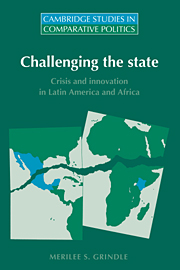Book contents
- Frontmatter
- Contents
- List of figures
- List of tables
- Acknowledgments
- 1 Challenging the state: a decade of crisis
- 2 Crisis and the state: evidence from Latin America and Africa
- 3 Crisis and breakdown in Mexico and Kenya
- 4 Imposing state authority
- 5 Managing the economy
- 6 Administering the public good
- 7 Responding to society
- 8 States of change
- Notes
- References
- Index
8 - States of change
Published online by Cambridge University Press: 27 August 2009
- Frontmatter
- Contents
- List of figures
- List of tables
- Acknowledgments
- 1 Challenging the state: a decade of crisis
- 2 Crisis and the state: evidence from Latin America and Africa
- 3 Crisis and breakdown in Mexico and Kenya
- 4 Imposing state authority
- 5 Managing the economy
- 6 Administering the public good
- 7 Responding to society
- 8 States of change
- Notes
- References
- Index
Summary
States vary in their ability to make positive contributions to economic and political development. They also vary over time in their capacity to manage essential tasks of development. And they vary along distinct dimensions of capacity for contributing to development. In previous chapters, I considered the extent to which the economically and politically difficult period of the 1980s and 1990s was a watershed for states in Latin America and Africa. A series of exogenous and endogenous shocks severely affected the ability of state leaders and institutions to mediate economic and political conflict. In many countries, the combined impact of economic and political crisis undermined institutional, administrative, and political capacities, even while it encouraged increased technical capacity.
At the same time, however, the crises of the 1980s and 1990s destabilized preexisting relationships among state, economy, and society in ways that opened up opportunities for redefining critical linkages among them. By undermining the viability of established development strategies and policies, weakening the coalitions of support for such public actions, discrediting prevailing ideas about the appropriate role of the state in development, encouraging new interests and groups to develop, and enhancing demands for participation and responsiveness, the period was historic in the sense of opening up possibilities for significant change. In the midst of difficulties, then, states in Latin America and Africa also experienced moments in which new departures seemed possible.
- Type
- Chapter
- Information
- Challenging the StateCrisis and Innovation in Latin America and Africa, pp. 180 - 194Publisher: Cambridge University PressPrint publication year: 1996

